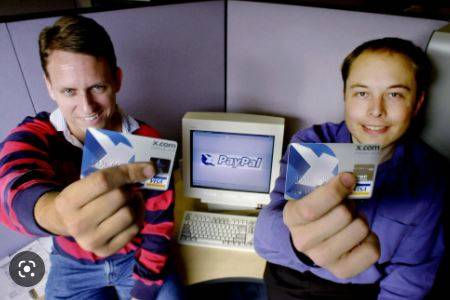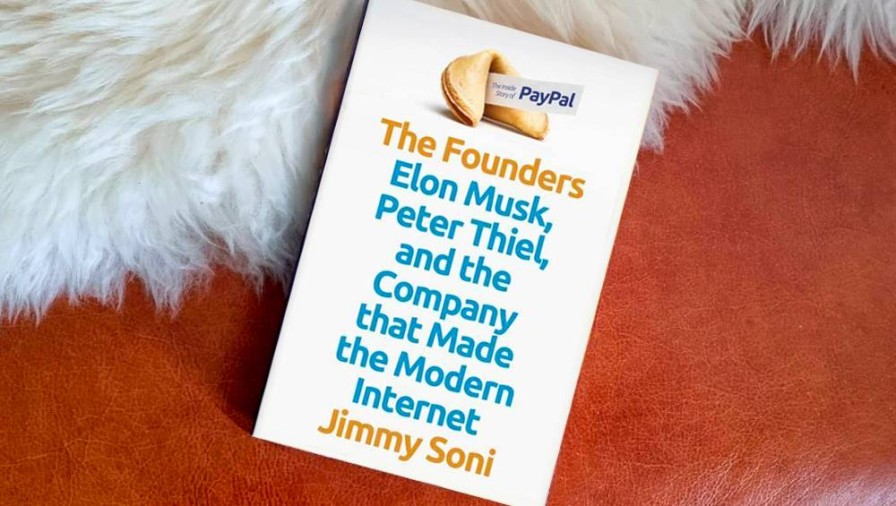

PayPal: The cool gang who made the modern internet
OPINION: Elon Musk and Peter Thiel laid foundations for Silicon Valley’s tech giants.
NBR columnist Nevil Gibson speaks with Fiona Rotherham.


OPINION: Elon Musk and Peter Thiel laid foundations for Silicon Valley’s tech giants.
NBR columnist Nevil Gibson speaks with Fiona Rotherham.
In her new thriller Birnam Wood, Eleanor Catton creates a caricature capitalist who bonds with a group of guerrilla gardeners to help prepare him to survive the coming apocalypse. This is based on the well-worn myth of Silicon Valley billionaires buying up chunks of Central Otago to build bunkers.
The capitalist is modelled on Peter Thiel, who was described by one biographer as “the contrarian” but who was also the smartest guy in any room. That wouldn’t be easy, if the room also included Elon Musk or a handful of others who have created billion-dollar businesses through their intellectual efforts.
Yet, remarkably, that is the case with Thiel, who with Musk and their colleagues at a single enterprise built, funded, or counselled nearly every Silicon Valley company of consequence for the past two decades.

Jimmy Soni.
“As a group, they constitute one of the most powerful and successful networks ever created,” writes Jimmy Soni, former Huffington Post managing editor and biographer of Dr Claude Shannon, the genius who worked at Bell Labs when it provided the tools for the information highway: touch-tone dialling, the laser, cellular networks, communication satellites, solar cells, and the transistor.
The group is loosely called the PayPal Mafia, though Soni despises the term as unbefitting for alumni who have gone on to create “world-changing micro-lending non-profits, produced award-winning films, written bestselling books, and advised politicians at every level”.
And there’s more. They’ve “taken as a mission everything from cataloguing the world’s genealogical records to restoring three billion acres of forest ecosystems…” They’ve also been at the centre of the biggest social, cultural, and political controversies of our age, “including bitter fights over free speech, financial regulation, privacy in technology, income inequality, the efficacy of cryptocurrency, and discrimination in Silicon Valley”.
These are The Founders, Soni’s book about “the company that made the modern internet”. Although written 20 years after the events it describes, The Founders justifies its existence by revealing how the culture of a single company created such a bountiful legacy that its origins have been overshadowed by its alumni's later enterprises: Facebook (David Sacks, Reid Hoffman); You Tube (Chad Hurley, Steve Chen, Jawed Karim); LinkedIn (Hoffman); Tesla (Musk); SpaceX (Musk); and Palantir (Thiel). Others you may have come across are Yelp, Yammer, Kiva, Slide, and Square.

PayPal alumni photographed in 2014 for a Telegraph magazine profile. 1 Jawed Karim. 2 Jeremy Stoppelman. 3 Andrew McCormack. 4 Premal Shah. 5 Luke Nosek. 6 Ken Howery. 7 David Sacks. 8 Peter Thiel. 9 Keith Rabois. 10 Reid Hoffman. 11 Max Levchin. 12 Roelof Botha. 13 Russel Simmons. Absent: Elon Musk.
Soni says his effort took five years, twice as long as intended, as it involved the many interviewees recalling events of 1998-2002, a period that included the ‘dot-com’ sharemarket crash and the 9/11 attacks on the World Trade Centre in New York and the Pentagon.
The result is 472 pages of text and source notes. Sadly, the book lacks an index and photographs. Unlike many accounts of American business, Soni doesn’t let too many facts get in the road of brilliant storytelling. Sources are provided for the recreation of events, often with differing perspectives.
While the household names are important to the story, Soni also gives credit to the scores of engineers, systems designers, network architects, product specialists, fraud fighters, and support personnel who worked at PayPal in the critical first few years.
He saves the best story for last: two young, convicted murderers who spent their years in jail collecting material on Thiel, Musk, et al, in the hope that one day they too could make a billion dollars legally rather than live out their existence as street criminals.
It was their inspiration, and valuable resource data, that enabled Soni to begin his task of bringing the early PayPal days back to life, long after it had become one of Wall Street’s most durable tech stocks.
PayPal alumni look back at the formative period as a watershed experience. “It influenced their approach to leadership, strategy, and technology,” Soni observes.
Thiel and partner Max Levchin, born in Germany and Ukraine respectively, founded Fieldlink, later Confinity, while attending Stanford Business School. Meanwhile, Musk, born in South Africa, had founded X.com after selling out of his first startup.

Peter Thiel and Elon Musk in the early days of PayPal.
The two enterprises were next-door neighbours in Palo Alto, each working on ways to send money by email for auction sites such as eBay. At that time, only 10% of online transactions were digital. They competed frantically, along with many others, but eventually it ended in fractious merger.
This was a more matter of survival than a meeting of minds, as Thiel and Musk had differing visions of the future of payments systems. But they had bonded through mutual respect, though Musk nearly killed them both when he crashed his McLaren F1 in 2000.
The outside environment was also hostile. The company was sued, defrauded, copied, and mocked. “Its founders took on the multi-billion-dollar financial firms, a critical press and sceptical public, hostile regulators, and even foreign fraudsters,” Soni recounts. In just four years, the company survived the bursting of the dot-com bubble, several government investigations, and a copycat product launched by one of its own investors.

PayPal’s app is one of the safest ways to do business on the internet.
PayPal remained the best and safest way to do business on eBay, the world’s largest online auction site. But the scrappy payments company was not the work of a single or even two geniuses. It was, in Soni’s words, the work of many, with deep disagreements and a case of “disharmony producing discovery”.
As the company headed toward an IPO amid the share slump of late 2000, Thiel resigned and chief executive Bill Harris, who kept the company on track, was fired. Musk replaced him, aged just 29.
PayPal’s head of communications Vince Sollitto described it as a system that enabled “high-risk and low-dollar amount merchants to accept credit cards online”. It sounded simple but beneath it lay an intensity of difficulty that challenged the most mind-bending graduates, of which PayPal attracted more than its share. One was Roelof Botha, born in South Africa and that country’s top student in actuarial mathematics.
An epic battle was fought between Musk’s support of Microsoft as the operating system platform and those, like Thiel, who favoured open-source Linux. This time, Thiel triumphed, with Musk moving on to his Tesla venture without rancour but keeping his large shareholding.
The IPO was the Nasdaq’s first after the 9/11 attacks, when financial markets were still volatile. While successful, PayPal lasted only a few months before eBay, which struggled with its own payments system, bought it for US$1.5 billion in late 2002. Either way, everyone made a fortune.
Thiel, Levchin, and major investor John Malloy left for new fields; those who stayed also thrived as PayPal continued to expand exponentially, eventually outgrowing its owner. Its second life as a listed company started in 2015 after it was spun off from eBay.

PayPal headquarters in Silicon Valley.
Today, PayPal has a value of US$83.4b, well down from its peak in 2020-21 of more than US$300b and that of credit card giants Visa (US$475.9b) and Mastercard (US$343.3b). But, despite the spike in 2020 when the pandemic pushed its payments volume to record highs, PayPal continues to expand. In 2022, it had 426 million active accounts in nearly every country of the world, with annual transactions of more than US$1 trillion.
It operates well under the radar compared with its founders, creating news only when it makes the occasional acquisition or promotes its woke credentials by refusing to process payment for people and companies that promote hate or discrimination.
It’s a far cry from the cauldron of creativity described by Soni, when PayPal did more than most to make the internet safe for business and capitalism.

The Founders: Elon Musk, Peter Thiel and the Company that Made the Modern Internet, by Jimmy Soni (Atlantic Books).
Nevil Gibson is a former editor at large for NBR. He has contributed film and book reviews to various publications.
This is supplied content and not paid for by NBR.
Sign up to get the latest stories and insights delivered to your inbox – free, every day.